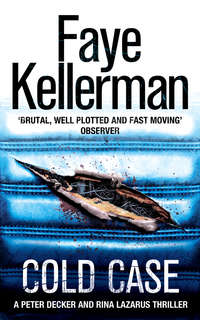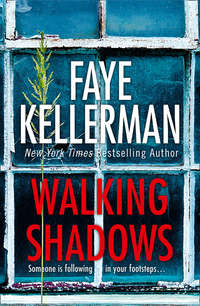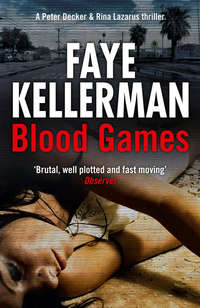
Полная версия
Sanctuary
Sharona’s eyes went from her lap, to the door, to Decker, back to the door, then to the ceiling.
Decker said, “You care about your cousins?”
The girl nodded.
“Talk to me.”
“He told me not to tell anyone.”
“Who? Dov or Gil?”
“Dov. Told me not to tell anyone he called.”
“When did he call?”
“Two days ago. Before Eema called the police.” She glanced at Decker, then looked away. “He said he was going away. He didn’t say where. He sounded nervous. He told me not to tell anyone, especially Eema and Abba. I asked him if he was in trouble …”
Decker nodded encouragingly.
Sharona met his eyes. “He hung up. That was it.”
“And you haven’t heard from him since?”
“I swear I haven’t.”
“Why didn’t you tell your eema about the call after she called the police?”
“I don’t know.” Her lip began to quiver. “I was scared she’d get mad at me for not telling her sooner. And I kept expecting to hear from Dov. I didn’t know Dov would be … I didn’t know the whole family …”
“Yes?”
“I didn’t think they were missing. I thought Dov had just had enough. I thought he just needed to get away from it all, you know?”
Decker said, “No, I don’t know. Please tell me.”
Sharona covered her face, then wiped her cheeks. “My uncle’s a diamond dealer. He’s very rich. Did you see the house?”
Decker nodded.
“Isn’t it humongous?”
Again, Decker nodded.
“Uncle Arik is really rich. I mean really, really rich! He made a fortune in diamonds during the eighties. Dov told me he made lots of his money selling big stones to the Japanese and the Chinese living in Hong Kong.”
“Dov seems to know a lot about the business.”
“He works there. They work there—both of them. My cousins … you’d think they’d be spoiled rotten, right?”
“Possibly.”
“Well, they’re not, at all. They have to beg for everything they get. That’s my uncle. Eema used to say he was the same way as a kid.”
“What does she mean by that?” Decker asked.
“I think she meant he was always a tightass—” Sharona blushed. “I mean he was tight with a buck.”
“His kids resent him?”
The girl looked at her lap. “It’s not like my cousins don’t believe in work. I believe in working, too. Everyone has to work to feel useful. My mom doesn’t have to work but she does. Aunt Dalia certainly doesn’t need to work, but she does. My uncle just overdoes it. Dov and Gil are carrying a full load at school, plus after-school sports and music lessons. Gil’s a top swimmer. They’re both good students. But that’s not enough. Uncle Arik makes them go downtown two days a week and on the weekends to learn about the diamond business. I don’t talk to Gil so much, but I know it’s a big drain for Dov. He’s very resentful.”
“How does he express his resentment?”
“Sulks. Escapes into his head. What can he do?”
“Escapes? You mean drugs?”
Sharona shrugged. “Maybe a little pot. But mostly I meant escape by being spiritual. He used to be very religious. I think deep down he’s still religious, but …”
Decker encouraged her to continue.
“Dov wanted to be more Orthodox … traditional.”
“I’m traditional, I understand.”
Sharona eyed him. “You don’t look Jewish, you know that?”
“So I’ve been told. Go on, Sharona. What happened to Dov’s journey into religion?”
“Nothing, that was the problem. Uncle Arik is very anti-Orthodox. Dov wanted to try to keep kosher, but my uncle wouldn’t do it. See, Uncle Arik wasn’t simply … disapproving. He was mean about it.”
“He made fun of Dov?”
“Exactly. Like his feelings weren’t important.” Sharona shrugged. “To Uncle, they weren’t. He wanted his sons to be clones of himself.”
Good luck, Decker thought. “What about Gil?”
“Gil is happy-go-lucky. He can fake things better.” The girl bit her nail. At that moment, she reminded Decker of her mother. Sharona looked up. “I don’t think Gil likes the business any more than Dov does.”
“Does Gil get along with your uncle?” Decker asked.
Sharona shrugged. “My uncle gets on Gil’s nerves, too.”
“Your uncle seems to get on a lot of people’s nerves,” Decker remarked.
“You mean his partner, Mr. Gold?”
Decker didn’t say anything, surprised that the kid knew about the conflict.
Sharona said, “Dov and I talk a lot. He said his father and Mr. Gold were always yelling at each other. And you know what?”
“What?”
“Dov said that Mr. Gold was right most of the time. Once Dov agreed with Mr. Gold right in front of his father. His father had a cow. The last couple of months, Dov and his father were fighting all the time.”
“Gil, too?”
“Gil has a car,” Sharona said. “Gil avoids fights by escaping—literally.”
“But Gil has to work in the business, right?”
“Like I said, Gil can fake it better. Dov has a harder time lying. I told you he’s very spiritual.” Sharona took a deep breath. “So when Dov called me … I thought he was running away to find himself. I thought he had finally had enough of his father and couldn’t take it anymore. I didn’t dare tell Eema. But I guess I should have.” The teen’s eyes watered. “If something happened to them—”
“Don’t torture yourself,” Decker said. “They could be safe and sound somewhere. You thought you were keeping your cousin’s secret. You couldn’t have known that it might be something bigger.”
Tears flowed down the girl’s cheeks. “You think it might be something bigger?”
“Yes, I do,” Decker said.
“Like … what?”
“I’m not sure yet. I need to ask you a few more questions. Tell me exactly what Dov said when he called.”
Sharona closed her eyes. “Something like … ‘Shar, I’m going away for a while.’ I asked him where he was going. He didn’t answer. He just said he needed to get away. Then he made me swear I wouldn’t tell anyone he called, especially Eema or Abba. Then I asked him if he was in trouble and he hung up.”
“Where did he call you?”
“On my phone.”
“Do you have a private line?”
The girl nodded.
“I’ll need your phone bill. I’m going to have to tell your eema why I need it. Do you want to tell your eema about the conversation or should I?”
The girl blew out air, lifting bangs off her forehead. “I’ll tell her. We have to do this right away, don’t we?”
“Yes, we do. I know Dov told you to keep this quiet. But I think he was really begging for help.”
“I sure hope you’re right.” She looked upward. “Because I’m going to get grounded. I don’t care. It’s worth it if it’ll help Dov.”
“It’ll more than help, Sharona. Who knows? It could even save a life.”
7
At least the jerk was listening, Marge was forced to admit. She and Decker were sitting across from the Loo in his office. Old Thomas “Tug” Davidson—once a Marine, always a Marine—still wore his hair in a crew cut. The fifty-five-year-old geezer didn’t realize that crew cuts had come full circle and were considered a statement by white boys with ’tudes. Fashion didn’t interest Davidson. He wore black suits, white shirts, black ties, and oxfords as oversized as the same-named dictionary. Tug was built like a barn—wide and strong. Marge felt he had probably declared holy war on fat many years ago.
“Go over this one more time,” Davidson said.
Marge repeated the pertinent information. The family had disappeared two days ago, the only hints of foul play—a one-minute phone call and an empty silver case that should have held a prayer parchment. The Yaloms’ sister had called the police in a panic. When interviewed, she had seemed on the level, but who knew?
“This guy, Yalom, is a diamond dealer?” Davidson said.
“Yep,” Decker said. “Does very well for himself judging by the house. But to hear his niece talk, Yalom’s a tightwad. I was wondering why he didn’t send his kids to private school. Maybe he’s too cheap.”
“Or maybe the niece is your average bimbo teenaged girl with a big mouth.” Davidson said, “The school doesn’t know shit about the boys’ whereabouts?”
“Not a thing,” Decker said. “I interviewed quite a few of their chums. They seem in the dark as well.”
“Except for the niece who got a phone call,” Davidson said. “Where was the booth?”
Decker said, “About two miles from the house. It’s a three-block shopping center. I have nothing definitive at this point. Tomorrow, I’d like to interview the store owners. It’ll take time, but something might pan out.”
Davidson nodded, folding sausage-shaped fingers into fists. “Tell me about this silver case.”
“It’s a standard Jewish talisman, for lack of a better word,” Decker said. “The one for the front door is always posted on the outside frame. The Yaloms had theirs posted on the inside—”
“Could be an oversight,” Davidson said.
“Not a chance,” Decker said. “It would be like wearing your underpants on the outside. It was deliberate. I think it once held valuables—diamonds, maybe.”
“Somebody took them,” Davidson said. “A robbery?”
“Or a convenient source of cash if the family had to split suddenly,” Marge said. “The sister said that was how her family dealt with the Nazis. The father paid off the border guards in stones.”
“An old habit that served them well in the past,” Decker said.
“What if it was a robbery?” Davidson asked. “Hiding diamonds in a weird place like that. Looks to me like it would have to be an inside job. What kind of help do these people have?”
“We’re working on finding the gardeners,” Marge said.
“Inside job might also be one of the kids,” Davidson said. “Kid swipes the stones, then makes a panic call to his cousin. So what do we got so far?” Davidson held up his thick hand and began ticking off options. “An inside robbery. A family on the lam. A Solomon thing. Or maybe even a Menendez thing. Any comments?”
Decker thought about Tug’s observations. Menendez and Solomon. Two big cases. The Menendez brothers had shotgunned their parents to death. The Solomons had been a family that disappeared off the face of the earth. No bodies had ever been recovered—the case an open hole on the books.
Decker said, “As far as we could tell, there was no killing done in the house. And all the cars were still in the garage—”
“Including the older boy’s car, right?”
“Yes,” Marge said.
“What’s his name?”
“The older boy?” Marge said. “Gil. Dov’s the younger one, the one who made the call to the cousin.”
“Okay, I got the names straight,” Davidson said. “Back to the cars. If all the cars were in the garage, you’ve got to be thinking about a family abduction. Because if the boys lured the parents to a spot in order to whack them, a car would be missing.”
Marge said, “Unless the boys returned the car to their house before disappearing.”
Davidson looked at her and squinted.
“Good point,” Decker said.
Davidson glared at him. “I know it’s a good point, Decker. You don’t have to stroke her ego.”
Decker’s voice was flat. “I’m just a nice guy.”
Davidson looked disgusted. “All right. So there’s a chance the boys whacked the parents.”
“The bimbo cousin also mentioned the father argued with his sons,” Marge said. “Especially the younger boy.”
Davidson squinted. “I argued all the time with my old man. I never thought of whacking him.”
“Just presenting motive,” Marge said.
“And I’m saying what a prosecutor would be saying,” Davidson said. “Kids and parents fight all the time. Most of us don’t wind up murdering our parents.”
Nobody spoke, then Davidson said, “Okay, it’s a consideration. The boys whacked the parents or someone whacked the whole family. What about the family taking off for parts unknown?”
“We thought about that,” Marge said. “We didn’t find the passports. Of course, the search was superficial. Could be Yalom kept them in his vault.”
“Vault?”
Decker said, “Yalom has a vault down at the Diamond Center.”
Davidson thought a moment. “He keeps his passport in the vault?”
Decker shrugged. “You know, Loo, even if we found passports it might not mean much. If Yalom suddenly went underground, he’d have to establish a new identity anyway. He wouldn’t need his old passports.”
Davidson said, “Why would he go underground?”
“Escape,” Marge said. “Maybe one of his diamond deals turned sour.”
“Guy’s a wily Israeli in a high-money business,” Davidson said. “Maybe he knows things the Feds would be interested in.”
Marge said, “He’s running from the Feds?”
“Maybe he’s working for the Feds,” Davidson said. “Maybe the guy was forced to sign up for the Witness Protection Program and that’s why the family just upped and disappeared.”
“I’ll check it out.”
“Yeah, do that, Dunn,” Davidson said. “Something’s out of kilter here. Poke around the neighborhood. See if they noticed strange suits and ties coming in and out of the house.” He turned to Decker. “Speaking of inside jobs, who’s gonna do Yalom’s partner?”
“Yo,” Decker said.
Davidson turned to Marge. “So you’re doing the paper on Yalom?”
“Yes.” Marge skimmed her notes. “Social Security number, credit cards, tax ID numbers, bank statements and info, passport office.” She looked up. “I’ll also call the Feds.”
“So tell me about the partner, Decker,” Davidson said.
“Shaul Gold.” Decker recapped what he knew. “I finally got hold of him. He seems cooperative. We’ve got a scheduled meeting with him tomorrow at eight in the morning.”
“He seem jumpy?”
“Surprised,” Decker said. “‘What do you mean my partner is missing?’ That kind of thing. But he was cooperative.”
“How long has he known Yalom?”
Marge said, “Sister says they’ve been partners for years. But they don’t get along.”
Davidson squinted. “So what? A lot of partners fight.”
Decker said, “A lot of partners kill each other.”
“Not the whole family, Decker.”
“Except that we’re talking about diamond dealers,” Marge said. “Lots of money.”
Davidson scratched his head. “Money. I take it the partner’s another little, wily, shrewd Israeli?”
“Gold is Israeli,” Decker said. “I don’t know if he’s wily, shrewd, or little.”
Davidson squinted. “I was thinking the guy might be a flight risk.”
Decker threw up his hands. “I can’t find evidence to detain him.”
Marge said, “We don’t have a drop of blood, let alone a body.”
Davidson drummed his fingers. “No justification for pulling him in. We’ll have to take our chances. All right. Leave the partner until tomorrow.” The lieutenant took out a notebook. “So this is what I got. Decker, you’ll do the shopping mall and the partner. Dunn, you’ll do paper and the neighborhood. This … voodoo silver case has been turned in to forensics for printing. Anything else you got in mind?”
“Not at the moment,” Decker said.
“Keep me informed,” Davidson said.
“We thought we’d stop by the neighborhood tonight, sir,” Marge said. “Before we go home.”
Davidson squinted at both of them. “They musta whipped you two hard at Foothill, huh?”
“No, we’re just bucking for overtime,” Decker grinned.
Davidson cracked a smile. “You’re barking up the wrong tree. You want money, get a law degree.”
“He’s already a lawyer,” Marge said.
Davidson leaned back in his chair. “No shit?”
“No shit,” Decker said.
“No wonder you’re such a wiseass.” Davidson waved them away. “Do what you want, but forget about overtime. Jackass county keeps voting down police bonds, we’ll be lucky if we draw our salaries.” He turned to Marge. “You got a look on your face, Dunn. What is it?”
“Do you want us to contact the media for assistance?” Marge asked.
The lieutenant gave it some thought. “Wait until you see what you’ve dug up. If you draw blanks, we’ll contact the networks.”
“You got it.” Marge started to rise, then sat back down. “Something else, Lieutenant?”
Davidson ran the palm of his hand across his crew cut. “Nah, I’m through. Get out of here. Both of you.”
“Don’t stroke her ego,” Marge fumed.
Decker sat down at his new desk recycled from a branch of the LA County Library that was shut down because of budget cuts. It was a gun-metal gray institutional number, but it had a kneehole large enough to accommodate his oversized legs, and two big file banks for case folders. Marge had a marred but functional oak desk donated by an office manager who had been forced to fire his secretary. The desks were placed front end to front end, which meant Decker and Marge sat across from each other.
Decker pulled out a manila folder and started a file on the Yaloms. “At least he took us seriously, Marge.”
“He had to. The case warranted it.”
“That’s for damn sure.” Decker started filling out the paperwork and handed forms over to Marge. “I’ll start a file on each of the boys; you do the parents. We’ll Xerox all our papers and notes so we’ll each have copies at our fingertips.”
“Rabbi Organized. How do you feel about your fellow countrymen disappearing?”
“You mean the Yaloms?”
Marge said, “The little, wily, shrewd Israelis.”
Decker said, “Why do I feel Old Tug has some preconceived notions about Jews and money.”
Marge said, “Probably has notions about women and blacks and Hispanics—”
“Oh, don’t start getting all pissy PC on me. I don’t think Davidson’s a racist. He probably hates everyone. Anyway, the Yaloms aren’t my countrymen. I’m American, remember?”
“You don’t feel any special twinge because they’re Jewish?”
“Nah.” Decker smoothed his mustache and went back to writing. “The only twinge I feel is for the boys.”
“If they’re victims.”
“If they’re victims,” Decker repeated.
Marge started filling out a Missing Persons form. “I think you scored a notch on Davidson’s belt.”
“By giving up law?” Decker continued to write. “Yeah, I saw that, too.”
“Why did you give up law?”
“’Cause I’m a gun-toting macho man and not a pussy wimp-ass in a designer suit.”
Marge laughed. “The real reason?”
“I gave it up because Jan had forced me into it. She wanted me to take over Daddy’s firm. Daddy did wills and trusts. It bored me to tears. I should have joined the District Attorney’s Office.”
Marge smiled. “Who knows? But for a slip of fate, you might even have been attorney general today.”
“I wouldn’t have been nominated,” Decker said. “I have balls.”
“Oh, don’t start becoming a pig on me.”
“It’s not a pig, it’s sour grapes.” Decker smiled. “S’right. I’ll keep my balls and let your sex take on the Attorney General’s Office.”
Marge lowered her voice artificially. “See what a broad can do.”
Decker laughed without looking up from his desk.
Marge pulled out a sheet and started doing paper on Arik Yalom. She thought of the photos in the family room. A dark, muscular, handsome man with money. He had a lot going for him. What the hell happened?
She said, “The case is getting … complicated.”
“Messy is the operative word,” Decker said.
“So many different angles of approach,” Marge said.
“So here’s a chance for you to prove yourself. Just don’t get bogged down with Davidson and his archaic attitudes. And let’s try not to overdo it with the overtime. Sure, it’s okay in the beginning for us to go the extra mile. But take it from me, Marge. Homicide detail will suck all the air from you if you let it. Don’t get obsessed with your cases.”
“Why not? You get obsessed with your cases all the time.”
“No, I don’t.” Decker went over the list of Yalom’s friends one by one. Nine of them. It was going to take a while. He’d better call Rina, tell her to hold his supper. “I don’t get obsessed, Marge, I just do my job.”
8
“Peter’s going to be late,” Rina said to her parents. “He said to eat without him. You want to get the boys, Mama? I’ll start serving supper.”
Magda Elias turned to her husband. Though she had lived in America for almost thirty years, she still spoke in an off-the-boat Hungarian accent. “You get the boys, Stefan. I’ll help Ginny with supper.”
The old man didn’t answer.
“Stefan, do you hear me?”
“What? What?”
“Peter isn’t going to make it for dinner, Papa,” Rina said. “Can you call the boys to the table?”
Stefan slapped the paper down on the armrest and hoisted himself out of the living-room rocker. “Everything’s okay?”
“Everything’s fine. He’s just working on a new case.”
“What kind of a case?”
“A family disappeared. An Israeli diamond dealer.”
Her parents waited for more.
“That’s all I know,” Rina said.
“Akiva’s looking for a family?” Magda asked. “I thought he was in murder now.”
“Maybe he thinks they were murdered, Mama.”
“Will he be home tonight, Ginny?” her father asked.
Rina smiled to herself. Her parents called her Regina—Ginny—which was her English name. And for some reason, they called Peter by his Hebrew name, Akiva. Maybe Peter sounded just too goyishe for them.
“Of course.” Rina turned to her mother. “Do you want an apron? I don’t think grease does well on silk.”
“This old thing?” Magda pinched the fabric of her blouse and let it drop.
Again, Rina held back a smile. It was a game with Mama. A way to amass compliments without looking needy. The woman was always dressed perfectly. Yet Mama had always been approachable even when Rina was a sticky-fingered child.
“Come into the kitchen,” Rina said. “Let me get you an apron.”
“If you insist,” Magda said. “Stefan, get the boys. Let’s eat before the baby wakes up.”
Rina came back to the dining room, holding a baking dish filled with spinach lasagne. She placed it on a tile trivet, and a moment later, her sons shuffled into the dining room. They plopped themselves down on the chairs after ritually washing their hands and breaking bread. Their long legs sprawled under the table. Rina looked at their pants cuffs—short again. Each must have grown another inch in the past month. The boys were generally good-natured except when they were tired.
Which was all the time.
Between the pounds of homework the school loaded on and the hormones of burgeoning adolescence, they were a cranky lot. Thank God for Peter—a stolid island of refuge in a sea of emotional turmoil.
Sammy adjusted his yarmulke and poured himself a glass of lemonade. “Wow. Lasagne. Is it dairy, I hope? I don’t want to be fleshig.”
“It’s dairy,” Rina answered. “Why don’t you want to be fleshig?”
“I want to eat a milk-chocolate candy bar.”
That’s a reason? Rina thought.
Magda brushed sandy-colored hair away from the boy’s brown eyes. “Think you would like to say hello to your omah?”
Sammy scooped up a double portion of lasagne and looked up at his grandmother. Her sentence came out “Tink you vould like to say hello to your omah?”
“Hi, Omah.” He stuffed a forkful of lasagne in his mouth. “Hi, Opah.”
“Hello, Shmuel,” Stefan said. “How are you today?”
Sammy smiled through a mouthful of noodles. “Okay.”
Stefan spooned a portion onto his younger grandson’s plate. “And how’re you doing, Yonkie?”
The younger boy smiled, pushing black hair off his forehead. “I’m doing okay. Thanks for the lasagne, Opah. Take some for yourself.”
“I will,” Stefan announced. “I love lasagne.”
“He eats my lasagne like candy,” Magda said.
Rina brought in a salad. “You make delicious lasagne, Mama.”
Magda blushed. “I’m sure yours is twice as good.”
“I’m sure it isn’t,” Rina said, smiling.
“Where’s Dad?” Sammy poured salad dressing over a mound of lettuce. “He’s never home anymore.”
“Yes, he is, Sammy,” Rina said. “He’s on a new case. Whenever he starts a new case, he has to put in extra hours.”









